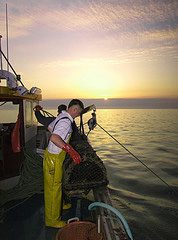25 February 2013
The NFFO’s South East Committee recently met in Shoreham to discuss a range of issues confronting the industry in Sussex, Kent and Essex.
Tony Delahunty from Selsey Fishermen’s association was unanimously re-elected chairman of the Committee and Paul Gilson from Southend, was elected as vice-chair. This gives coverage from south and north of the Thames on the Federation’s Executive Committee.
Under-10m Quotas
The Committee spent a considerable amount of time discussing a way forward on the under-10 m quota issue. It took the view that a stalemate had developed which was damaging to all sides of the industry. The meeting agreed that it was time that the industry as a whole took the initiative by taking the issue out of Government’s hands. POs and under-10 groups could themselves develop consensual, real-time, quota transfer arrangements where surpluses/shortages are identified. The current logjam could be broken but the key would be a two-way dialogue directly between the parties. It was agreed to take the Committee’s ideas forward with a view to presenting a case to Government for endorsement within a very short timeframe.
New TACs
The Federation’s work in opposing new TACs for bass and red mullet was supported. Introducing new TACs could only make mixed fishery management within the context of a looming discard ban more complex. Besides there are alternative means available of ensuring that the bass stocks remain stable.
Marine Conservation Zones
Plans for ensuring a comprehensive fishing industry response from the South East to the Government’s consultative proposals for a network of marine conservation zones were discussed. It was agreed that it was vitally important for the local industry to register its concerns and for the NFFO to insist that any MCZ designations and management measures within MCZs are introduced only on the basis of sound evidence and thorough dialogue with those potentially affected directly and indirectly. The Committee agreed arrangements to ensure that local views are fed into the final NFFO and MPAC response.
Discards
The Committee echoed the concerns expressed earlier in Rye on the proposed EU discard ban. Whilst reducing unwanted catch was an honourable objective, a rushed, politically driven, discard ban with unrealistic timeframes and prescriptive legislation, contained tremendous capacity to create mayhem at vessel and port level. Without an adequate scope to deal with species that have a high survival rate, there is considerable potential to score an own goal in fishing mortality and fisheries management terms. Plaice, skates and rays were the species on which most concern focused. It was agreed to work intensively on the practical implementation issues that would inevitably arise.
Wind-farms
The potential displacement effect of offshore wind-farms in the area and the disruption during the installation of export cables was raised as an area of concern. The Federation outlined its work with the Crown Estate, individual win-farm developers and the cable laying industry, all undertaken with the aim of minimising impacts at local level.
Industry Reputation
Port representatives expressed disquiet about the relentlessly hostile media coverage focused on fishing which wholly ignores the central role played by all parts of the industry in ensuring the nation’s food security. It was agreed that the enormous funding streams from US foundations to NGOs was an important contributor to the negative image held by the general public. The Federation’s efforts to counter superficial and politically damaging coverage were applauded.
Two-Way Communication
It was agreed that if the views of fishermen in the South East were to receive the attention that they deserve, ways of ensuring that information flowed from the ports to the Federation and from the NFFO to the ports essential. Partly, this could be achieved through modern communications but fully engaged port representatives are crucially important.

